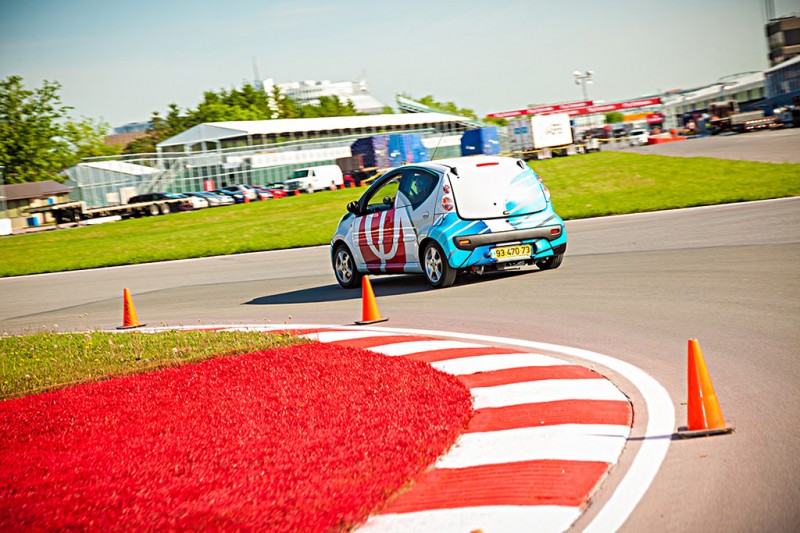You’d be forgiven for thinking that the title of this article is an April fools. However, it is indeed now a reality that could resign range anxiety to the history books.
Alcoa, the Canadian based Aluminium company) and Phinergy (an Israeli clean energy company) debuted a zero-emissions electric demo car powered by a revolutionary aluminum-air battery at the Circuit Gilles-Villeneuve in Montreal. Alcoa and Phinergy are collaborating on new materials, processes and components to commercialize the aluminum-air battery, which can extend the distance an electric car travels by approximately 1,600 kilometers (1,000 miles). Martin Briere, President of Alcoa Canada, said:
“Automakers want technologies that enable zero-emission electric cars to travel distances that compete with gasoline-powered cars. The aluminum-air battery has the potential to meet that challenge using fully recyclable material with no CO2 emissions. Quebec’s focus on growing electric-powered transportation with the goal of being a leader in green technology, provides a strong backdrop for today’s debut. Alcoa and Phinergy look forward to collaborating with the Quebec government to advance this technology and the potential development of the aluminum-air battery in the province. Furthermore, our aluminum production facility in Baie-Comeau is well positioned to supply the aluminum for the battery.”
The key with these aluminium-air batteries is that they use the air around us to extract oxygen from. This is in stark contrast to traditional chemical batteries where all the components needed for electricity production are within it. Using air makes these batteries more like an internal combustion engine which also needs air to burn the fuel vapour. The advantage is the battery requires a lot less weight than a standard battery since one of it’s core components isn’t carried on-board. The battery features a porous electrode with which it absorbs air.
So what’s the catch? Well, firstly the battery requires water to complete the chemical reaction so that’s not really a catch, it’s more a feature but more importantly it is non rechargeable just like a Duracell bunny, the battery will wear out.
Based on the 1,000 mile range and average motorist miles, most drivers would need a replacement battery every month. However, as the battery is light weight (approximately 25 kilos) and uses air and water, it is pheasible battery swapping could become a viable option.
Traditionally, batteries prove too heavy or expensive to warrant battery swapping. In the case of the Tesla Model S for example, which does support battery swapping, each battery costs around $25,000 and therefore a battery swap station with just ten batteries would have $250,000 worth of stock laying about and that’s not bringing into account the machinery required to exchange the extremely heavy batteries either. The realities of the economies don’t add up. However, if the batteries were (much) cheaper and weigh only 25 kilos, then being swapped inexpensively and without the need for expensive and complex machines could become a reality.
Furthermore, Phinergy state they see the batteries being used in conjunction with a lithium-ion cell and as such it is possible drivers would only need install an aluminium-air battery when about to embark on a long journey. In this way, the device could be loaded into a car like a cartridge in a printer.
Aviv Tzidon, CEO of Phinergy, said:
“Electric vehicle adoption has been slowed by the limited range of regular batteries, causing what is commonly known as ‘range anxiety’. With Phinergy’s technology, and Alcoa’s industrial leadership across both the aluminum value chain and the automotive market, we see an exciting opportunity to help move electric vehicles into the mainstream.”
The aluminum-air battery uses air and water to unlock the energy stored in aluminum. According to Phinergy, just one of the 50 aluminum plates in the battery can power a car for approximately 20 miles, and when used to supplement a lithium-ion battery, can extend vehicle range by approximately 1,600 kilometers (1,000 miles). The technology allows an energy density that surpasses conventional battery technologies and creates electric vehicles with travel distances, purchase prices and life-cycle costs that are comparable to fossil-fuel cars.
Phinergy are working hard on other metal-air batteries, most notably using zinc instead of aluminium which they say should give better longevity over the aluminium version. Aviv Tzidon has confirmed a contract gas been signed with a major manufacturer to bring the technology to market by 2017.
Source; Alcoa

